Empire of the MoonThe Gutians were the real beneficiaries of the Akkadian Empire's downfall, although Uruk held out for another 30 years or so before it was the next to fall beneath Gutian rule. The king lists say that at first there were no Gutian kings who were famous and they "just ruled over themselves" for 3-7 years. It has been suggested that this means they were tribal chiefs who held office in rotation. Later traditions from the Babylonians saw this as a time of chaos and barbarity, when the temples of the gods were looted and women and children of the land were slaughtered, especially in Akkadian lands. There are indications that the Gutians became assimilated into Akkadian culture. Dedication inscriptions show that they adopted their gods and some of the later Gutian kings even have Semitic names.Unmentioned by the king lists, Lagash began to gain some power during this time. It's fourth king, Gudea, claimed to have taken control of Uruk and Nippur, and even conducted a campaign against the Anshan, in southwest Elam. His inscriptions makes references to trading expeditions and to temples being built for the gods. The money gained through tribute and trade helped to reinvigorate the city-states of Sumer and one by one they began to regain their independence.6 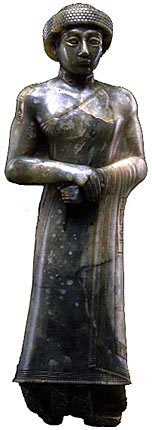 Gudea of Lagash, 2141-2122 B.C. 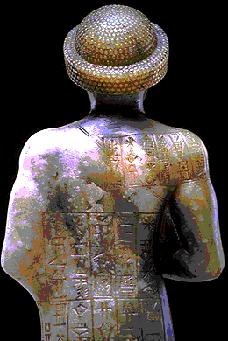 Gudea, Back view The Poem of Utu-Hegal tells how the king, with the help of the gods, went up against the Tirigan, the king of the Gutians. He occupied both sides of the Tigris, blocked the water's path to the irrigation fields, and closed the roads, causing the grass on the highways of the land to grow over.
But the king, endowed with power by Enlil, chosen by Inanna with her heart -- Utu-Hegal, the mighty man, came out from Uruk to face him and set up camp(?) at the temple of Ishkur. He addressed a speech to the citizens of his city: "Enlil has given Gutium to me and my lady Inanna will be my help! Dumuzi, Mother-Dragon-of- Heaven has declared "It is a matter for me!" and assigned Gilgamesh, the son of Ninsun to me as a constable!" The citizens of Uruk and Kulaba rejoiced and followed him with one accord. He lined up his élite troops.
On the way to Karkara he captured two of Tirigan's generals and there he prayed to Ishkur, asking for his help since Enlil had given the Gutians to him. There he laid a trap and when the Gutian army attacked, they were routed and Tirigan ran away on foot. Tirigan thought he would be safe in Dabrum but was captured by the citizens and kept until Utu-Hegal came and arrested him and his family. He blindfolded and tied their hands, made him lay down and then stepped down on his neck. Then he "made the Gutians, the fanged(?) snake of the mountains, drink again from the crevices." The poem ends with kingship returned to Sumer. 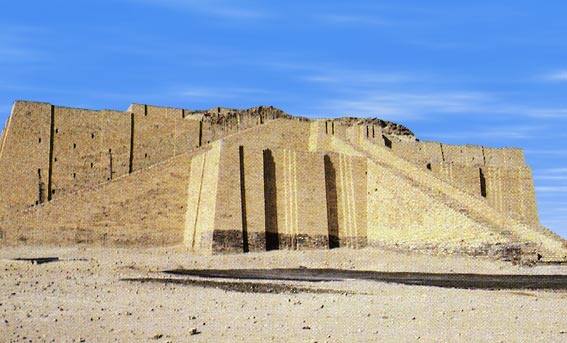 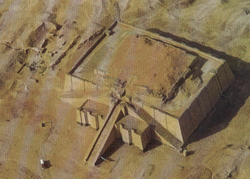 Ziggurat to the moon god Nanna Discovered by J.E. Taylor, British Consulate, as directed by the Foreign Office, 1854 Excavated by Sir Leonard Woolley with joint American-British team, 1923 16
4. If the wife of a man followed after another man and he slept with her,
Another of his promotional poems reads:
I am Ur-Nammu, king of Ur, the protecting genius of my city. I strike against those guilty of capital offences, and make them tremble. The fear I cause ....... My judgments make Sumer and Akkad follow a single path. I place my foot on the necks of thieves and criminals. I clamp down on evildoers, who will be caught like snakes. I ...... fugitives, and their intentions will be set right. I make justice apparent; I defeat wickedness. As if I were fire, even my frowning is enough to create peace.
He says that since he has become king no one has added extra taxes to abundant crops, he has released water into the canals for the trees to grow, lifted the yoke off the male prostitutes of the city, and brought the savage Gutians under control.
"I, who have been treated like this, served the gods well, set up chapels for them. I have created evident abundance for the Anunna gods. I have laid treasures on their beds strewn with fresh herbs. Yet no god stood by me and soothed my heart. Because of them, anything that could have been a favorable portent for me was as far away from me as the heavens, the ....... What is my reward for my eagerness to serve during the days? My days have been finished for serving them sleeplessly during the night! Now, just as the rain pouring down from heaven cannot turn back, alas, nor can I turn back to brick-built Ur."
Although she did not stand up for him, Inanna was not happy at An and Enlil's change of plans, and in a fierce storm destroyed cattle-pins and sheepfolds, wanting to hurl insults at An. She then said she would not enter her temple if her shepherd king wouldn't be there for her. Among the tears and laments of the people, another fate was decreed: that Ur-Nammu's name would live on, that people would admire the canals he dug, the reed-beds he drained, the barley fields he harvested and the fortresses and settlements he founded. His name would also be used in order to drive away evil spirits.
Why should a singer put them in hymns? An eminent example deserves eternal fame. What is the use of writing lies without truth? For me, the king, the singer has recorded my exploits in songs about the strength of the protective deity of my power; my songs are unforgettable, and my words shall not fall into oblivion. I am the best king of the Land. From the very first origins until the full flourishing of mankind, there will never be any king who can measure himself against my achievements whom An will let wear his crown or wield his scepter from a royal throne.
After continuing with more self-praises for his power, insight and wisdom, he describes himself as a weapon for downfall of the rebel lands. He then makes this vow:
Now, I swear by Utu on this very day -- and my younger brothers shall be witnesses of it in foreign lands where the sons of Sumer are not known, where people do not have the use of paved(?) roads, where they have no access to the written word -- that the firstborn son is a fashioner of words, a composer of songs, a composer of words, and that they will recite my songs as heavenly writings, and that they will bow down before my words as a ......
Shulgi also wrote bedtime lullabies for his son, wishing him a good future wife. Another song dedicated to Shulgi lists all the major cities of Sumer and Akkad that he traveled to. Another text, The Blessing of Shulgi, tells how the "good shepherd" rang in the new year by taking a boat ride to Uruk, where he visited the temple E-anna. He wore a special robe and crown for the occasion and entered the temple leading a sheep and holding a kid goat to his breast. Delighted by Shulgi's visit, Inanna "spontaneously struck up a song":
"When I have bathed for the king, for the lord, when I have bathed for the shepherd Dumuzi, when I have adorned my flanks (?) with ointment (?), when I have anointed my mouth with balsamic oil, when I have painted my eyes with kohl, when he has ...... my hips with his fair hands, when the lord who lies down beside holy Inanna, the shepherd Dumuzi, has ...... on his lap, when he has relaxed (?) ...... in my pure (?) arms, when he has intercourse (?) with me ...... like choice beer, when he ruffles my pubic hair for me, when he plays with the hair of my head, when he lays his hands on my holy genitals, when he lies down in the ...... of my sweet womb.....
Two more lines of Inanna's song are unclear, but she ends it saying that if he treats her tenderly in bed, she will do the same. As a ritual of the Sacred Marriage Rite, Shulgi took on the incarnation of Dumuzi and facilitated the god's husbandly duties in order to ensure the fertility of the empire for the coming year. After practicing the fertility rite the goddess Inanna "decreed a fate", imitating Inanna's pledge to Dumuzi in the Courtship of Dumuzi and Inanna, promising to be his leader, armor-bearer, advocate and encourager. Utu then greets him and invites him to his own temple E-Babbar ("House of White") in Larsa, where we was decreed another good fate and then sent to Ninazu's temple in the town of Enegir. There Ninazu kept the heaps of rhetoric piling in, asking Shulgi questions like who could stand up to him when he shrieked like an Anzu bird? He was then sent to Suen's temple of E-Temen-Ni-Guru, where the moon god decreed another good fate to him for accomplishing his mission of reducing the houses of the rebel lands to ruins. The story comes to a finish with Shulgi taking his seat on the holy dais in his lofty palace Ninegala, decreeing judgments so that the strong do not abuse the weak, so that the mother would speak tenderly to the child and the child answer truthfully to his father.
You are to receive the gold and silver from him, and purchase grain everywhere according to (?) whatever exchange rate they will take from you. May your .... nothing at all. From today (?), you are my son who makes me happy. The cities of (?) the province (?), the land of the Martu, Elam -- all of them I have placed before you: you are just as important as I am. So sit before them on a throne on a golden dais ....! Let their messengers prostrate themselves in front of you!
He then gives Ishbi-Irra the authority to appoint and remove governors, commanders, and captains and to blind any murderers that are caught. Ishbi-Irra would continue to be a major official in the Ur III government after Shulgi's rule as well.
If my lord agrees, may he provide me with additional workmen and set the wages (?) for me. ...... did not succeed ...... tribute of the provinces (?).
Shulgi reigned for 47 years and then died, leaving his throne to his son Amar-Suena. A single text from this time records that the people turned against this king and the lands were invaded by foreign lands, causing Enki's temple, E-Engur (also called E-A or E-Abzu) to be laid waste. The text laments that it took nine whole years to finally rebuild the temple, due to a long list of excuses the king kept coming up with. Amar-Suena's idleness was duly punished by the destruction of his palace, although the text is too fragmented to determine the circumstances.
As long as Enlil was my lord (?), what course were you following? And is this how you alter your word? Today Enlil detests me, he detests his son Suen, and is handing Ur over to the enemy. Its central part (?) is gone, the enemy has risen up, and all the lands are thrown into disarray. But on the day when Enlil turns again towards his son Suen, you and your word will be marked out!
Desperation set in and massive inflation took over. In the 7th year of his reign, barley and fish sold for 50 to 60 times their normal price.6 Rebellion and uprisings became rampant. The city of Nippur withdrew it's recognition and Ur III soon came to an end. The empire lasted about 100 years.
A messenger of Ishbi-Irra came to me. He presented himself before me announcing: "Ishbi-Irra, my lord, sends you a message:
The letter then reports that Ishbi-Irra took control of the area and did everything he said he would. The letter ends saying:
Now Ishbi-Irra is looking in my direction. I have no ally, nobody with whom I can align myself. Since he has not yet been able to get me in his grasp, let me come to you when he falls upon me. My lord should know this!
To this pitiful cry for help, Ibbi-Suen gave this reply:
When I had chosen for you ...... from among the troops, they were at your disposal, as governor of Kazallu. But as in my own case, are not your troops proof (?) of your importance?
Within the next two of three years, Ishbi-Irra was able to extend his authority to Nippur and Uruk to become the next official king of Sumer and Akkad. 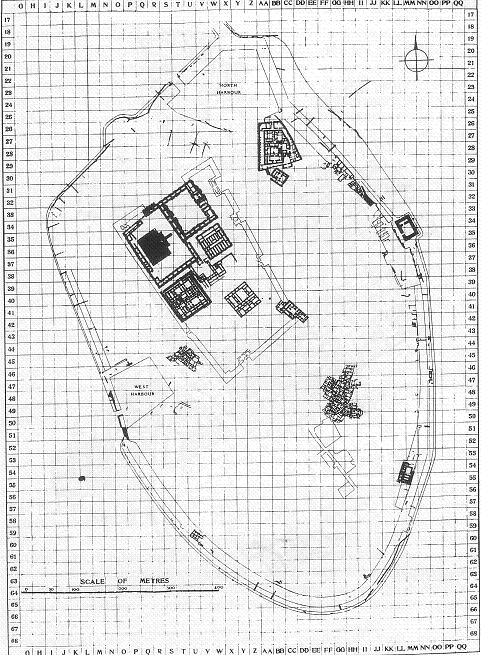 Drawn by Sir Leonard Woolley The reign of Shu-Ilishu's son, Iddin-Dagan was a peaceful one and his son Ishme-Dagan set about some social reforms to "set justice in the land". The next son in line was Lipit-Ishtar, who propagated a new law code. Once again, the Amorites became a problem during his reign, and he was forced to allow the rival king of Larsa to peacefully annex the city of Ur in order to defend it from the Amorite invaders. The king of Isin's daughters were even allowed to keep their priesthood. But the move cost Isin a lot of it's prestige and as a consequence, Isin lost even more power. Lipit-Ishtar died that same year and his crown was usurped. Gungunum of Larsa (1932-1906 B.C.) was the brother of the former king of Larsa, Zabaja, and was a sheik of the Amorites. After annexing Ur, he went on to conquer Lagash, Uruk and the Elamite capital of Susa, and then revived trade overseas with the kingdom of Dilmun. His son Abi-Sare invaded Isin, and killed Lipit-Ishtar's usurper Ur-Ninurta. This did not stop Ur-Ninurta's son Bur-Suen from taking the crown though. Abi-Sare's son Sumuel took the throne in 1895 B.C. and wrestled control of Nippur away from Isin. Sumuel ruled almost three decades before a he was overthrown by a commoner named Nur-Adad. Nur-Adad ruled for 16 years and then his son Suen-Iddinam took over. After him were three more kings who ruled no more than 5 years a piece: the last of which was Silli-Adad, who was killed in a battle with Babylon. His throne was usurped by a man named Kudurmabuk, who took control over the lands and installed his son Warad-Suen on the throne. Although Kudurmabuk is an Elamite name, he was probably an Amorite chieftain. After a short reign, Warad-Suen was succeeded by his brother Rim-Suen (1822-1763). The last Sumerian king was the most adaptable monarch of them all. At 59 years, Rim-Suen had the longest authenticated reign in Mesopotamian history and was also the last monarch to claim divinity. He defeated Babylon in battle in 1794 B.C. and then conquered Isin, making himself the sole ruler of the greater half of southern Babylonia. In 1787 B.C. Hammurapi of Babylon invaded and conquered Isin, but failed to take Uruk. That was the last war between them until the end. In 1779 they signed a treaty in which he may have regained Isin. But the peace treaty was broken and his land conquered by Hammurapi (better known as Hammurabi). By this Hammurapi installed the beginnings of the Babylonian Empire and extinguished the last flowering bud of Sumerian culture. What was to continue was a religious derivation built on top of the Sumerian and Akkadian traditions. The theology since the Early Dynastic Period built the right to kingship on the acceptance of a council in Nippur, acceptance that was given when the king brought about a military defeat on the present capital. Powerful families from each city would conserve money and resources for many generations before a king from a long and prestigious line would attempt a coup and have all the cities bring tribute to their hometown. But by holding on to these traditions, there was always the shadow of inevitable defeat. Some of these dynasty changes would set off chain reactions of battles, which would only better open the land up to foreign invasion. But ever since the Akkadian Empire, cities had been becoming more and more centralized, and the Babylonian Empire was the most centralized yet. The centralization was more than just political, it was also theological. A new god was brought into the pantheon, Marduk, the son of Ea (Enki). His common name Ba'al ("Lord" or "Husband") is linked to the name of the devil in the New Testament. In many respects, he mirrored the legends of Ninurta. By slaying the dragon Tiamat (Nammu), the storm god was able to take the Tablets of Destiny for himself. Fulfilling their end of the bargain, the gods all gave their epithets over to him, making him the new king of the gods. Having given all their titles over to Marduk, the gods became incarnations of Marduk. Now, it was Marduk who had created the world by splitting Tiamat's body, it was Marduk who created the Tigris and Euphrates out of Tiamat's eyes, and it was Marduk who created man from out of the blood of god. The Assyrians took on many of the same traditions as Babylon but appeneded their own national deity, Ashur (Anshar) in place of Marduk's. New ranks among the pantheon were formed as the patron city god system made way for the patron country god system. With the new system, Babylon was able to usurp all of Nippur's authority. In Babylonian writings, Enlil was designated to the same station as Anu: making decrees but never actually acting out a role in the story. His name almost always follows that of Anu, as if they have been merged into one god. Although Babylonian legends would of course never portray the antagonism the people of Nippur must have felt over this, it may not have been lost on those who traveled there. This may have been the source of conflict that the storm god had with his father in the Hurrian and Greek legends. Just as a younger god was able to become king over the pantheon by slaying the original mother of the universe, so to did the Amorites who inherited Sumero-Akkadian culture conquer those who taught it to them. 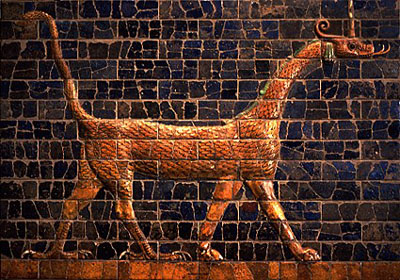 Dragon of Marduk 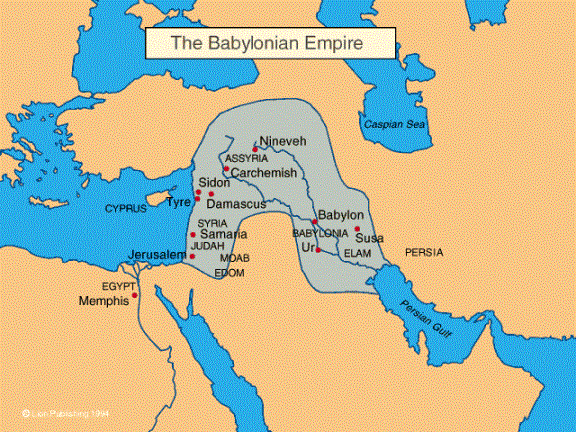 |